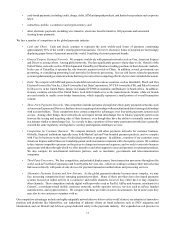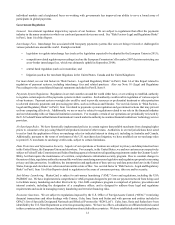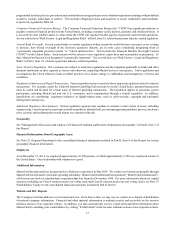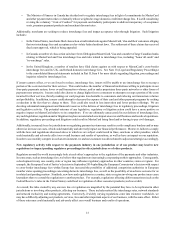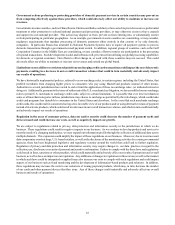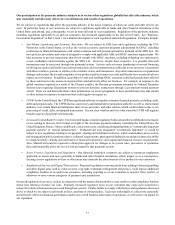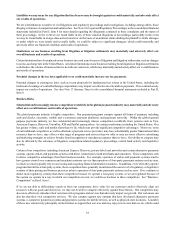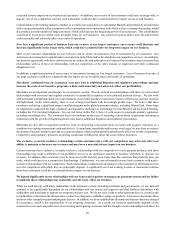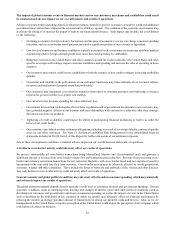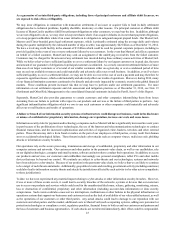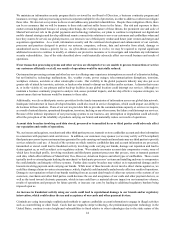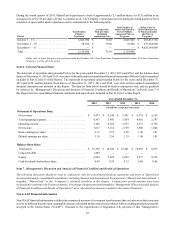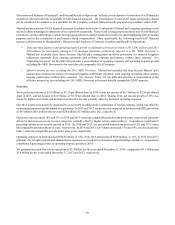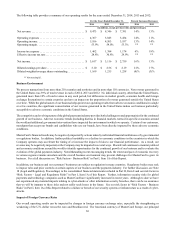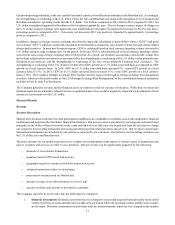MasterCard 2014 Annual Report Download - page 23
Download and view the complete annual report
Please find page 23 of the 2014 MasterCard annual report below. You can navigate through the pages in the report by either clicking on the pages listed below, or by using the keyword search tool below to find specific information within the annual report.21
turn, our customers’ success depends on a variety of factors over which we have little or no influence. If our customers become
financially unstable, we may lose revenue or we may be exposed to settlement risk. See our risk factor in “Risk Factors - Business
Risks” in this Part I, Item 1A with respect to how we guarantee certain third-party obligations for further discussion.
With the exception of the United States and a select number of other jurisdictions, most in-country (as opposed to cross-border)
transactions conducted using MasterCard, Maestro and Cirrus cards are authorized, cleared and settled by our customers or other
processors. Because we do not provide domestic processing services in these countries and do not, as described above, have direct
relationships with cardholders, we depend on our close working relationships with our customers to effectively manage our brands,
and the perception of our payments system, among consumers in these countries. We also rely on these customers to help manage
our brands and perception among regulators and merchants in these countries, alongside our own relationships with them. From
time to time, our customers may take actions that we do not believe to be in the best interests of our payments system overall,
which may materially and adversely impact our business. If our customers’ actions cause significant negative perception of the
global payments industry or our brands, cardholders may reduce the usage of our programs, which could reduce our revenues and
negatively impact our results of operations.
In addition, our competitors may process a greater percentage of domestic transactions in jurisdictions outside the United States
than we do. As a result, our inability to control the end-to-end processing on cards and other payment devices carrying our brands
in many markets may put us at a competitive disadvantage by limiting our ability to maintain transaction integrity or introduce
value-added programs and services that are dependent upon us processing the underlying transactions.
We rely on the continuing expansion of merchant acceptance of our products and programs. Although our business strategy is to
invest in strengthening our brands and expanding our acceptance network, there can be no guarantee that our efforts in these areas
will continue to be successful. If the rate of merchant acceptance growth slows or reverses itself, our business could suffer.
The perception of our brands and reputation may materially and adversely affect our overall business.
Our brands and their attributes are key assets of our business. The ability to attract and retain cardholders to our branded products
depends upon the external perception of us and our industry. Our business may be affected by actions taken by our customers
that impact the perception of our brands. From time to time, our customers may take actions that we do not believe to be in the
best interests of our brands, such as creditor practices that may be viewed as “predatory”. Moreover, adverse developments with
respect to our industry or the industries of our customers may also, by association, impair our reputation, or result in greater
regulatory or legislative scrutiny. We have also been pursuing the use of social media channels at an increasingly rapid pace.
Under some circumstances, our use of social media, or the use of social media by others as a channel for criticism or other purposes,
could also cause rapid, widespread reputational harm to our brands. Such perception and damage to our reputation could have a
material and adverse effect to our overall business.
Our work with governments exposes us to unique risks that could have a material impact on our business and results of
operations.
As we increase our work with national, state and local governments, both indirectly through financial institutions and with them
directly as our customers, we may face various risks inherent in associating or contracting directly with governments. These risks
include, but are not limited to, the following:
• Governmental entities typically fund projects through appropriated monies. Changes in governmental priorities or other
political developments, including disruptions in governmental operations, could impact approved funding and result in
changes in the scope, or lead to the termination of, the arrangements or contracts we or financial institutions enter into
with respect to our payment products and services.
• Our work with governments subjects us to U.S. and international anti-corruption laws, including the U.S. Foreign Corrupt
Practices Act and the U.K. Bribery Act. A violation and subsequent judgment or settlement under these laws could subject
us to substantial monetary penalties and damages and have a significant reputational impact.
• Working or contracting with governments, either directly or via our financial institution customers, can subject us to
heightened reputational risks, including extensive scrutiny and publicity, as well as a potential association with the policies
of a government as a result of a business arrangement with that government. Any negative publicity or negative association
with a government entity, regardless of its accuracy, may adversely affect our reputation.


